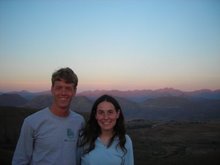




So this weekend I helped marshal the Roof of Africa, one of the craziest and most technically demanding motorcycle races in the world. My friend Matt and I spent three days hanging out in various scenic spots in Lesotho waiting for the bikes to arrive, helping service crews organize themselves for the arrival of the riders and checking in the bikes when they arrived. It was a long three days, but well worth it. We moved progressively further from town each day into more remote mountain areas. Around 300 riders started on Thursday in the time trial, about 260 started Friday's section and about 120 on Saturday. Some withdrew because of injuries, some because of mechanical failures and others because they had to be able to hit a certain time for the course and couldn't do it. All-in-all, I don't know how many finished, but I can't imagine it was more than about 70. It was a brutally tough race over rocks, mountain passes and through some pretty difficult terrain. These pictures only capture the race around the checkpoints (the easiest and most accessible parts), but believe me, the riders reported some crazy obstacles. Of course it rained for part of Thursday and Friday taking a difficult trail and making it harder. I must say that all the guys are crazy, but at the same time, this is their ultramarathon and I respect them for having the guts to try it and to make it as little or as far as they did. We all have our vices and passions in life and these guys have a particularly wild one!
The winner was a guy from New Zealand who made the rest of the field look like amateurs (which they certainly were not). The best description I came up for his riding was that he rode his motorcycle down the hills like he was skiing, slaloming back and forth as if the bike were a part of his feet rather than a couple hundred pounds of metal. He gapped the field by a wide margin. The pictures on the left show some of the fueling stops with the support crews and a couple of riders I managed to snap photos of as they went by. The one of the rider headed straight down a mountain pass was on the last day of the race as the riders headed into the most difficult section of the trail. It was a mountain pass at 2200 meters (7,200 feet or so) that they crested, checked in and headed back down, only to climb up the pass on the other side of the mountain again! They had completed about 1/3 of the route at that point and still had a long, challenging day ahead of them. Hope everyone had a good Thanksgiving.



